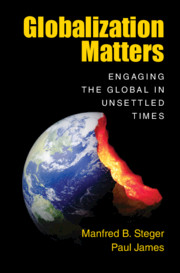Book contents
- Globalization Matters
- Globalization Matters
- Copyright page
- Contents
- Figures
- Acknowledgements
- 1 Introduction
- 2 Mapping a New Genealogy of ‘Globalization’
- 3 Rethinking the Dominant Framework of Globalization Theory
- 4 Considering the Subjective Dimensions of Globalization
- 5 Outlining an Engaged Theory of Globalization
- 6 Excavating the Long History of Globalization
- 7 Examining the Promise of Global Studies
- 8 Making Sense of the Populist Challenge to Globalization
- 9 Confronting the Global Urban Imaginary
- 10 Living in the Unsettled World of the Anthropocene
- 11 Concluding Reflections
- Appendices
- Bibliography
- Index
8 - Making Sense of the Populist Challenge to Globalization
Published online by Cambridge University Press: 01 August 2019
- Globalization Matters
- Globalization Matters
- Copyright page
- Contents
- Figures
- Acknowledgements
- 1 Introduction
- 2 Mapping a New Genealogy of ‘Globalization’
- 3 Rethinking the Dominant Framework of Globalization Theory
- 4 Considering the Subjective Dimensions of Globalization
- 5 Outlining an Engaged Theory of Globalization
- 6 Excavating the Long History of Globalization
- 7 Examining the Promise of Global Studies
- 8 Making Sense of the Populist Challenge to Globalization
- 9 Confronting the Global Urban Imaginary
- 10 Living in the Unsettled World of the Anthropocene
- 11 Concluding Reflections
- Appendices
- Bibliography
- Index
Summary
Contrary to influential theses of the ‘end of ideologies’, the early twenty-first century has witnessed the revival of political ideologies deeply opposed to democratic liberalism. The most recent of these ideational clusters is what we call ‘anti-globalist populism’—a particular strain of right-wing national populism that focuses on the alleged negative impacts of globalization. The remarkable success of anti-globalist populism is most spectacularly reflected in the electoral victory of Donald Trump in the United States and the triumph of the Brexit alliance in the United Kingdom. This chapter maps and critically evaluates the core ideological concepts and claims of anti-globalist populism. We employ a morphological discourse analysis—a qualitative method for a contextually sensitive mapping and assessing of the structural arrangements of political ideologies—that attributes connected meanings to a range of mutually defining political concepts. Ultimately, the chapter seeks to contribute to a better understanding of the shifting ideological landscape in the twenty-first century and the crucial role that globalization is still playing in this transformative process.
- Type
- Chapter
- Information
- Globalization MattersEngaging the Global in Unsettled Times, pp. 187 - 208Publisher: Cambridge University PressPrint publication year: 2019

